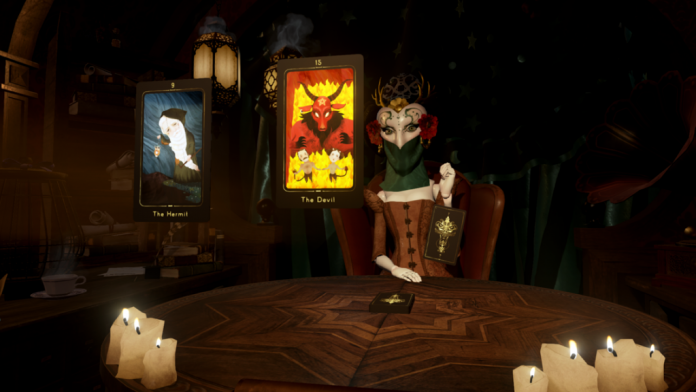Psyop’s Kismet has come out of left field for launch on Oculus Rift and HTC Vive, offering an experience unlike anything previously seen in virtual reality (VR). In fact, Kismet is a very different offering to anything experienced with the videogame medium as a whole. While this may be an exciting prospect, ‘new’ doesn’t always equate to ‘good’, and Psyop have to be very careful walking that line coupled with the dreaded VR for VR’s sake trap that many developers are falling into.
A packaged comprised of three experiences, Kismet is hosted by a secretive automated being of the same name. Female in visual and vocal presentation, Kismet invites the player to participate in one of three activities, each offering a differing amount of interactivity.
The Cards is the first mini-game offered, which is a virtual rendition of a tarot card reading. For those interested in such things the presentation is choreographed so well that the revelation of each card is a truly tense experience. However, despite the high quality of Kismet’s voice acting, there is only one dialogue commentary for each card. This is disappointing to say the least, for as vague as the cards are (thus, relatable to whatever predicament the player can think of) having a more varied outcome would undoubtedly increase reliability after the third- or fourth virtual reading.
The second piece of Kismet’s puzzle, The Stars, is a daily horoscope reading. The introduction is largely the same each time, though the result differs greatly. Again, the horoscope offered is vague enough to apply to any given life circumstance and yet there remains something captivating about the experience. ‘Presence’ may be putting too fine a point on it, but Kismet certainly is immersive for the few moments in which you genuinely believe that the digital fortune teller is talking directly to you.
The final option, Ur, is a virtual recreation of an ancient board game. Also known as ‘The Royal Game of Ur’ or ‘Game of Twenty Square’, Ur is essentially a primitive version of Ludo. Each player has three tokens which they must move to the end of the board. Movement is dictated by the dropping of four pyramid dice and the exact number must be met to achieve reaching home with each piece. Additional rules are limited; consisting of extra turns on special squares and sending opponent pieces home when landing atop. It’s simple and truly a shame the multiplayer gameplay hasn’t been included, but still Ur remains fun for a limited time.
Visually, Kismet is a remarkably compelling product. The incidental details is often what makes a VR experience more compelling than a similar product on a traditional 2D monitor, and in Kismet developer Psyop has spared no expense in this regards. Creating ambiance has been handled delicately, from the changing pace between the three components to the mise-en-scène, Kismet’s aesthetic is both compelling and unique. The fact that Kismet is built using Unreal Engine 4 has no doubt helped with the visual fidelity, but the exceptional characterisation presented by the videogame is undoubtedly Psyop’s own.

Kismet is a small and well rounded package, offered at a comfortable price ($6.99 USD at the time of writing). This isn’t a videogame experience that’s going to draw your attention for entire evenings – after the first instance of play it’s likely that most will only return for a few minutes at a time – and yet Kismet stands as a great example of invention in VR.









![Insta360 X4 Video Compilation [No Talking]: 8K, Slow-Mo, Timelapse](https://news.lecce360.com/wp-content/uploads/2024/04/1713362788_maxresdefault-218x150.jpg)





